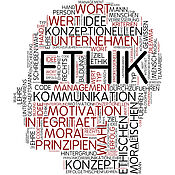What is Theological Ethics ?
Theological ethics (which was called moral theology in the past) explores the significance of the Christian faith for human action and endeavour in the world of today. Although its methods are based on those employed in the philosophic, human (for example, psychology, sociology, literary criticism), and scientific disciplines, its guiding perspective is theological. Christian faith, as it is found in the bible and the various Christian traditions highlights the dignity of the human person; hence, the question of how we should act in a human (and thus humane) way is intrinsically linked to the Christian faith. Theological ethics is thus rooted in both ethical reasoning and theology, and strives for a universally valid understanding of ethical principles, ethical criteria, and ethically appropriate problem-solving procedures.
In the discipline of theological ethics, therefore, ethical issues are investigated from the perspective of the Christian faith. Other approaches also have their own presuppositions and preconceptions concerning the nature of human life and the principles according to which humans should live. These are very often unexamined and can produce very different ethical stances. Ethical reasoning of whatever kind needs to be aware of its own assumptions. It is only then that genuine dialogue can take place between groups and individuals whose ethical views are based upon different premises.
Ethical conceptions are thus generally founded upon a particular worldview or ideology, which, In the case of theological ethics, is the anthropological hermeneutics of the Christian faith. It is from this perspective that the discipline seeks to integrate all the manifold dimensions and challenges of human life.
As an academic discipline, theological ethics is also connected in many ways with other disciplines. Only through an interdisciplinary approach can theological reflection relate to reality, when understood as the place that God holds in the world. We cannot find God outside the world but only in the world, since God became human in this world. At the same time, theological ethics cannot be separated from the Church of Jesus Christ, which is "in the world but not of the world", meaning that theological ethics takes a critical view on the world without withdrawing from the world. Bound to the world and the challenges of our time, as well as to the gospel, theological ethics is answerable to society in general, since its duty is to formulate ways to promote the welfare and harmonious coexistence of all human beings.

